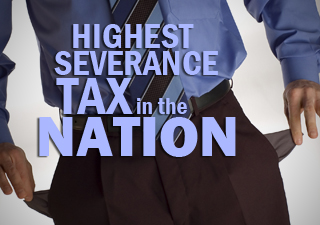Media

The Invisible Severance Tax
Did you know Pennsylvania imposes a severance tax on natural gas workers? It’s known as an impact fee, but it operates just like a severance tax.
The fee is levied on each well drilled, and the fee amount is determined by a number of factors, including the price of gas and type of well. According to testimony from the Independent Fiscal Office (IFO), the fee is projected to generate $210 million for state and local governments this year. If this projection holds, the impact fee’s effective tax rate will be 4.7 percent. This figure almost matches the 5 percent rate Gov. Wolf called for during his campaign.
But it’s like the impact fee is invisible to many proponents of a severance tax, who point out Pennsylvania’s uniqueness in being the only gas producing state without a tax on natural gas. Even if this were true, shouldn’t policymakers strive to make Pennsylvania more competitive by keeping taxes as low as possible? Imposing an additional tax on an industry because other states have done the same is a poor justification.
Uniqueness, in this respect, isn’t a hindrance; it’s an asset.
Furthermore, of the states currently imposing a severance tax, most enjoy better tax climates than Pennsylvania. A higher severance tax only compounds this problem. If the goal is to make Pennsylvania a better place to live and work for everyone, workers should not be required to bear the brunt of higher taxes. Gov. Wolf’s push for a severance tax is a direct violation of this principle.
His severance tax proposal carries a whopping 17.3 percent effective tax rate with it, which would be the highest in the nation. Imposing this tax is sure to cause pain for employees in the gas industry. Critics dismiss such arguments, but it’s hard to believe taking more than $1 billion out of the natural gas industry and transferring it to state government will not have an adverse effect on the people whose livelihoods depend on Marcellus Shale.
There’s also a moral component here. Why should workers in one industry be singled out for higher taxes? Would a tax only on farmers or doctors be fair and appropriate? Most would say no.
For too long, Pennsylvania’s natural gas industry has been thought of as a quick revenue stream instead of the economic engine driving the state to prosperity. If the former mindset prevails, expect the latter to stall.